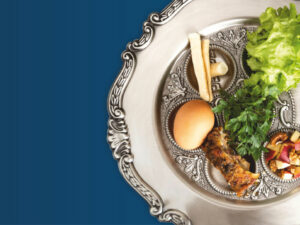You know the story of the couple who went to the therapist. The husband had all kinds of claims against his wife: The house wasn’t neat, she never made him supper, she criticized him often… And the wife? She felt her husband didn’t appreciate all of the hard work she did, he was not there for her emotionally, he was too easily angered by the kids, and so on.
Furthermore, the wife expressed her jealousy of her neighbors, the Goldsteins.* “The Goldsteins are the perfect couple,” she said. “Their house is spotless and their kids are perfect. They are the epitome of shalom bayis. When I see them, the deficiencies in my own marriage are even more obvious.”
The therapist had something on the tip of his tongue that he wished he could tell them, but he couldn’t because of privacy concerns. The secret that was at the tip of his tongue? That his next client was the Goldstein couple, and their problems and difficulties were far greater than the couple sitting in front of him…
Perhaps this story is true, perhaps it is apocryphal, but the lessons to be learned from it are many. First and foremost, never judge others by outer appearance. Sometimes a family can appear picture perfect; on the outside, they look like they have the most idyllic life. And it could be they do. It is very likely, however, that they also have their own peckel. You just don’t know about it.
A Life of Difficulties?
This world, the seforim teach us, is an olam hatolaos, a world of difficulty. Some people have more difficulties, some fewer, but everyone has difficulties. That is the way Hashem created the world. The difficulties are very hard, but Hashem, in His wisdom, knows that it is what we need, even if we can’t understand it.
I was thinking about this when contemplating the life of Yaakov Avinu. Look at all the tzaros that Yaakov Avinu experienced. When he eventually comes before Paroh, he admits that his days were difficult. He had tzaros from Eisav, difficulties with Lavan, his wife Rochel passed away in childbirth, he suffered from the selling of Yosef, he was in grief over what happened to Dinah, and later he was pained by Shimon being held captive by Yosef and the thought of losing Binyomin.
What was Yaakov’s reaction to all of those difficulties? How did he respond to such an apparently hard life?
There is a posuk in last week’s parsha that offers a lesson for us. Yaakov Avinu says, “Kotonti mikol hachassodim… I have been diminished by all of Your kindness that You have done for Your servant, for with my staff I crossed this Yardein, but I have now become two camps…” Rashi explains that Yaakov was afraid that his merits had been diminished by all of the kindness that Hashem did for him. Interestingly, the first lesson we can learn from here is how Yaakov, despite all of his difficulties, chose to focus on the kindness that Hashem did for him.
The Lesson in the Word “This”
The Tur asks a question. Why does Yaakov say, “For with my staff I crossed this Yardein”? He was nowhere near the Yardein when he said this.
The Medrash Shocher Tov answers that Yaakov never forgot or lost sight of any chesed that Hashem did for him. Even if the chesed transpired days or years earlier, Yaakov felt as if he had experienced it that second. Thus, even though he was already far from the Yardein, Yaakov viewed the chesed of crossing the Yardein with nothing and then becoming two camps as if it had just transpired. The Imrei Emes explains that the lesson from Yaakov Avinu is that even when things are difficult, even when you have to deal with an Eisav or worse, always remember the good that you have received in the past as if you just experienced it.
He also says that a person’s ability, when undergoing great pain and suffering or minor pain and suffering, to transcend pain and remember the many good things Hashem has done for him in the past is itself a tremendous way to merit rachamei Shomayim and be spared the present difficulty.
We all go through difficulties. So many of us have tremendous difficulty making peace with our personal tzaros. We are human beings and at times can’t help but wonder, “Why is this happening to me? Why does life have to be so hard? Why do I have to experience such terrible anguish?”
Appreciating the Good
Perhaps one of the things we should do is stop and remember all of the good that we have experienced from our earliest years until now.
It makes sense that doing this can arouse Hashem’s mercy as well. As parents, teachers or friends, imagine if you have a child/student/friend who is always tremendously thankful for even the smallest thing. Imagine your child saying, “Mommy, thanks so much for the delicious supper,” or, “Thanks so much for buying me such beautiful clothes,” or, “Thanks so much for taking me to shul and for learning with me…” Then, when that child says, “Mommy, can I please have another outfit,” you will feel so much better about giving it to him/her. Why? Because you know how much he/she appreciates everything that you do for him/her. You know how thankful he/she is even for things from last week, last year or longer ago that most would have long forgotten about.
Similarly, a person who constantly thanks Hashem for everything that He has done for him has the ability to merit Hashem’s rachamim to release him from his present travail as well.
We are not hardwired to think this way. Most of us naturally focus on what we are missing rather than on what we have, because what we have is sort of “in the bag.” We take it for granted. Somehow, that which is missing is at the forefront of our mind.
The Importance of…a Thumb
A friend of mine recently cut his thumb with a very sharp knife. Hatzolah came and rushed him for medical care. They were able to save the thumb, but he had to undergo a long period of rehabilitation. In a moment of candor, he said, “I didn’t realize how thankful I had to be to Hashem for this little thumb! There are so many things that I can’t do when my thumb is all bandaged up and unusable. I can’t open bottles, cut things, or tie my shoes all because of a damaged thumb!”
The posuk says, “Kol haneshomah tehallel Kah hallelukah.” Chazal learn from here that for every breath that a person takes, he has to praise Hashem. We take so many breaths each day that we don’t even realize what a brocha it is to be able to breathe. A person with uncontrolled asthma or a person on a respirator cannot breathe.
Thinking of Hashem’s kindness does not have to necessarily be in matters of health alone. Just think of all the good things that Hashem has done for you. He sent you to a school or yeshiva. He sent you a role model. He made your shidduch. He gave you a child or children. Once we have these things, we take them for granted. We stop thanking Hashem for them each day.
The Medrash is telling us that aside from the fact that it is the right thing to do, constantly thinking about the good things that Hashem did for you in your life is the best insurance to prevent bad things and difficulties from happening.
This is why Yaakov acted as if he had just crossed the Yardein. He saw Hashem’s kindness as if it had just happened.
Yes, it takes time, but if we learn how to turn on our gratitude switch, and how to constantly contemplate the many amazing things that Hashem did for us and is doing for us, we will recognize that this olam hatolaos is also a world of tremendous good and kindness.








